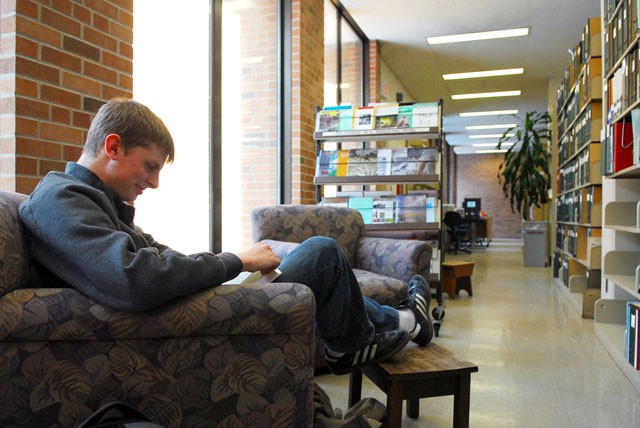University of Minnesota senior Lillian Ballard studies for two hours every day in the Forestry Library. But with a new proposal to merge two St. Paul libraries, she could soon lose her quiet space âÄúon the hill.âÄù
Facing decreased attendance and a 7.7 percent reduction in their budget for 2011, University Libraries has proposed consolidating the two least-used of the 14 libraries on the Twin Cities campuses âÄî Entomology, Fisheries, and Wildlife and Forestry.
The proposal would create a Natural Resources Library, combining the most frequently used materials in the location of the current EFW Library in Hodson Hall. Skok Hall, which is currently home to the Forestry Library, would house lesser-used collections available upon request.
Ballard said students are worried about losing access to quality research materials, helpful staff members and quiet space for studying. The Forestry Library, she said, is conveniently located below the student lounge in Skok Hall and across from Green Hall, where most of her classes are held, while there is limited study space in Hodson Hall.
âÄúI feel like theyâÄôre kind of overlooking the importance of what we have here,âÄù Ballard said.
Karen Williams, associate University librarian for academic programs, said the two libraries were identified because of low circulation data in 2010. The Forestry Library had approximately 5,200 resources checked out, compared with 28,600 from the Music Library, she said.
âÄúTheyâÄôre important resources, but the actual physical use is significantly lower than the other branches,âÄù Williams said.
Brenna Malovrh, a student worker in the EFW Library, said a busy shift would consist of six people coming in.
âÄúItâÄôs not going to be like walking into Walter [Library],âÄù Malovrh said.
Many of the students who come in are âÄúregulars,âÄù she said. They know what resources they want and where they can find them.
Monday was the first time University first-year Roger Borgeson used the Forestry Library âÄî and it was only necessary for an assignment in his forest resources class.
âÄúThis is the only time I will ever step foot in here,âÄù Borgeson said.
Williams said the changing ways students utilize library systems has contributed to library branch closings and consolidations at colleges across the country.
âÄúItâÄôs very much a trend,âÄù Williams said.
The University of Iowa merged four of its branch libraries into a Science Library last May after five years of significant budget cuts and increased electronic usage, said University of Iowa Libraries Spokeswoman Kristi Bontrager.
âÄú[Many libraries are] re-shifting and thinking about how they can work differently and better,âÄù Bontrager said.
The University has merged library branches in the past. In 1985 Walter Library became home to the geology, chemistry, physics and engineering library branches.
The student board of the College of Food, Agricultural and Natural Resource Sciences will hold an informational meeting for students with a library representative March 7.
Elizabeth Olson, president of the CFANS student board, said students are concerned their major will be âÄúslimmed down.âÄù
âÄúYou really want your whole major to stay strong and have as many services as possible,âÄù Olson said.
Williams said University Libraries held an open meeting for input a year ago and worked closely with affected department heads.
A survey will be sent out to students and faculty in departments heavily involved with the libraries: forest resources, entomology, fisheries, wildlife and conservation biology, bioproducts and biosystems engineering and plant pathology.
The review period is being extended, Williams said, because students wanted more time to discuss and share input. Many have an âÄúaffinityâÄù for their study space.
âÄúThereâÄôs general support for a consolidated Natural Resources Library,âÄù Williams said. âÄúItâÄôs just where itâÄôs located thatâÄôs being debated right now.âÄù
The proposal is expected to cost $135,000 initially but save $130,000 annually. Williams said the libraries have cut two staff positions.
A decision will be made on the plan by the end of the semester with an implementation date targeted for next January, Williams said, but that could change based on the final outcome.
âÄúIt doesnâÄôt mean libraries arenâÄôt important anymore,âÄù Williams said, âÄúit just means that folks are using us differently.âÄù

Mortuary Science sophomore Luke Mooi is one of the two students studying Tuesday at the EFW Library. Because of the minimal use of the Fishery Library in Skok Hall and the EFW Library in Hodson Hall, a decision will be made by the end of the spring semester.
University may merge two St. Paul libraries
Budget reductions and decreased attendance led to the proposal.
by Jill Jensen
Published March 2, 2011
0

